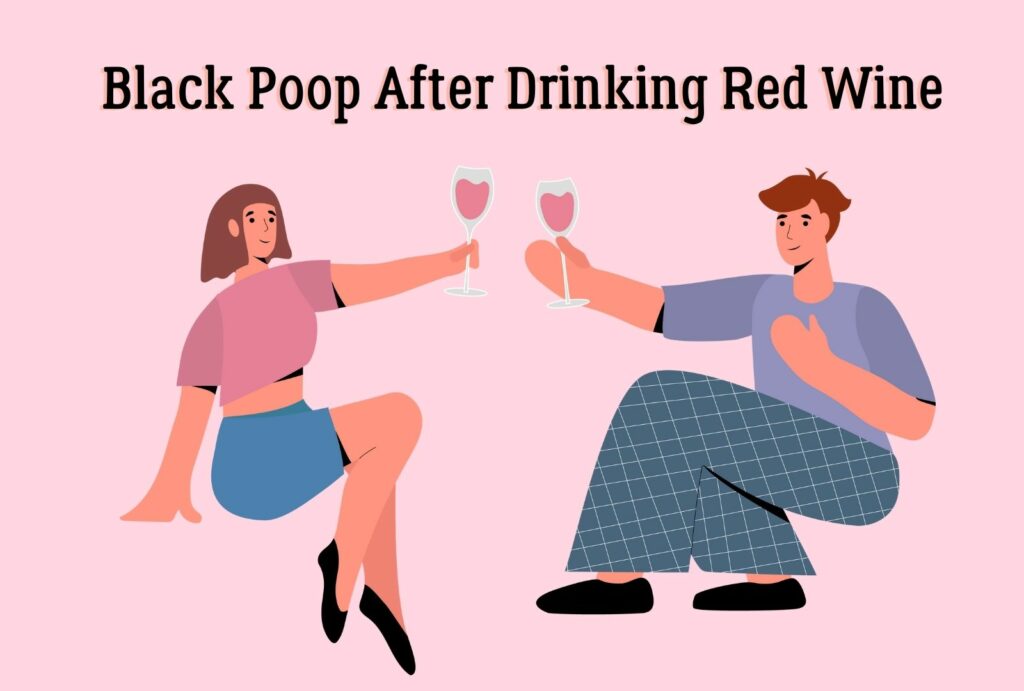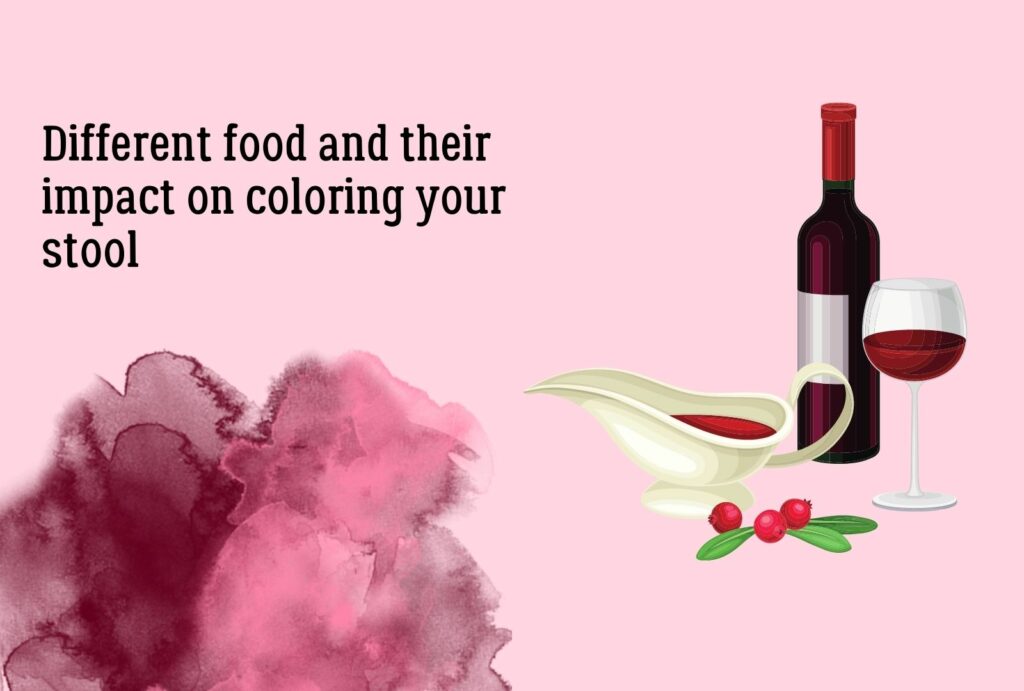
Have you ever noticed that your stool is dark after enjoying a glass or two of red wine? This can be a concerning symptom, but it is important to understand that it is not uncommon and can be caused by a variety of factors. While red wine itself does not make your poop dark, it can contribute to this symptom in some cases.
The color of your stool is largely determined by what you eat and drink. Certain foods and drinks, like red wine, can contribute to a change in the color of your stool. However, red wine itself does not directly cause dark stool. Instead, it is the tannins in red wine that can contribute to the darkening of stool. Tannins are compounds found in many plants, including grapes, and can contribute to a variety of health benefits.
In addition to tannins, other factors can contribute to dark stool after drinking red wine. These can include gastrointestinal bleeding, iron supplements, or even certain medications. If you are concerned about the color of your stool after drinking red wine, it is important to monitor any accompanying symptoms and consult with your healthcare provider if you have concerns.
Managing dark stool after drinking red wine may involve identifying and addressing any underlying causes of the symptom. For example, if the dark stool is caused by gastrointestinal bleeding, treatment may involve medication or surgery to address the underlying issue. Similarly, avoiding certain foods and drinks or adjusting the dosage of certain medications may help reduce the occurrence of this symptom.
Overall, dark stool after drinking red wine is usually not a cause for concern and can be managed with lifestyle changes or medication in some cases. However, it is important to monitor any accompanying symptoms and consult with your healthcare provider if you have concerns. Understanding the underlying causes of this symptom can help you identify any potential health issues and manage this symptom effectively.
Does red wine turn your poop black, and why?
Red wine can cause black stool in some individuals due to its high tannin content. Tannins are natural compounds found in grapes and other foods, including tea, coffee, and chocolate. Tannins can cause discoloration of the stool by binding to the iron in the body, which leads to the formation of a black pigment known as iron tannate. This reaction can happen in the stomach or intestines, leading to black or dark-colored stool.However, not everyone who drinks red wine will experience black stool. The amount of tannins in the wine, as well as an individual’s digestive system, can determine whether or not they will experience this side effect. Some people may be more sensitive to tannins, while others may be able to metabolize them more effectively.
In addition to tannins, other factors can also cause black stool. Certain medications, such as iron supplements, bismuth subsalicylate (Pepto-Bismol), and some antibiotics, can cause dark-colored stool. Gastrointestinal bleeding can also lead to black stool, as blood in the digestive tract can cause the stool to appear dark or black.
If you are experiencing black stool after drinking red wine, it is essential to monitor your symptoms and contact your healthcare provider if you have any concerns. Your doctor can perform a physical exam and recommend any necessary tests to determine the cause of the black stool. In some cases, additional treatment or monitoring may be necessary, depending on the underlying cause.
If you are concerned about the tannin content in red wine, there are ways to reduce the amount of tannins you consume. For example, you can choose lighter or fruitier red wines that have lower tannin levels. Additionally, drinking plenty of water while consuming red wine can help to dilute the tannins and reduce the risk of developing black stool.
In conclusion, red wine can cause black stool in some individuals due to its high tannin content. While this side effect is typically harmless, it is essential to monitor your symptoms and contact your healthcare provider if you have any concerns. Additionally, if you are concerned about the tannin content in red wine, there are steps you can take to reduce your risk of developing black stool.
Different food and their impact on coloring your stool

Various food items can alter the color of your stool, and some of them can make it appear darker than usual. For example, consuming beets, black licorice, blueberries, or iron supplements can give your stool a reddish tinge, which might be mistaken for black. Similarly, taking bismuth-containing medications, such as Pepto-Bismol, can make your poop appear black due to the reaction between bismuth and sulfur compounds in your gut. However, in the case of red wine, it is not the direct cause of black poop, but its byproducts might contribute to it.
Red wine contains tannins, which are plant compounds that give it a distinct flavor and color. Tannins also have astringent properties, which can make your mouth feel dry or puckery. During the digestion process, tannins can bind with the iron in your food or supplements and form complexes that are difficult to break down. These complexes can travel through your digestive system and eventually end up in your stool, where they can contribute to its dark color. However, this process is not exclusive to red wine, as other beverages or foods rich in tannins, such as tea or dark chocolate, can also have a similar effect.
Another food item that can affect the color of your stool is grape juice, which might be mistaken for red wine due to their similar taste and color. Drinking grape juice can turn your stool purple or dark red, similar to the effect of red wine. However, this discoloration is harmless and typically resolves within a few days.
If you notice black stool after drinking red wine or consuming any other food item, it might be worth paying attention to other symptoms, such as abdominal pain, nausea, or vomiting. Black stool can be an indication of internal bleeding, which can occur due to various medical conditions, such as peptic ulcers, gastritis, or colorectal cancer. If you experience any of these symptoms, it is advisable to seek medical attention immediately to rule out any serious underlying conditions.
In conclusion, red wine might not directly turn your poop black, but its byproducts, such as tannins, can contribute to the dark color. However, other food items, such as beets or bismuth-containing medications, can also have a similar effect. If you notice any unusual changes in the color of your stool, it is important to pay attention to other symptoms and seek medical advice if necessary.Are there any other possible effects of red wine on your body?

Red wine contains a compound called tannin that can have a range of effects on the body. While it is not uncommon for red wine to make your poop dark, there are other potential effects to be aware of. For example, tannins in red wine can cause dry mouth and throat, as well as tooth discoloration. They can also lead to headaches in some people.
In addition to tannins, red wine also contains alcohol, which can have its own set of effects on the body. Excessive drinking can lead to dehydration, liver damage, and increased risk of certain types of cancer. It can also contribute to high blood pressure, heart disease, and other health problems.
However, when consumed in moderation, red wine has been associated with a range of potential health benefits. It contains antioxidants that can help reduce inflammation and protect against oxidative stress. Studies have also suggested that moderate red wine consumption may be linked to a lower risk of heart disease, certain types of cancer, and cognitive decline.
It is worth noting that the effects of red wine consumption can vary depending on the individual. People who are prone to migraines, for example, may be more likely to experience headaches after drinking red wine. Additionally, some people may be more sensitive to tannins and other compounds in red wine, and may experience more severe side effects as a result.
Overall, while red wine can have a range of effects on the body, the occasional glass or two is unlikely to cause significant harm. However, if you experience persistent changes in your bowel movements or other symptoms after drinking red wine, it is important to speak with your healthcare provider to rule out any underlying health conditions.
Other possible causes of black poop
Black poop is not always caused by red wine consumption, and there can be several other reasons for it. In some cases, it can be a sign of an underlying medical condition that requires prompt attention. One possible cause of black poop is the presence of blood in the stool, which can be an indication of bleeding in the gastrointestinal tract. This could be due to a number of reasons, such as ulcers, tumors, or hemorrhoids. If black poop is accompanied by other symptoms like abdominal pain or cramping, it is important to seek medical attention.
- Certain medications, supplements, and vitamins can also cause black poop. Iron supplements, for example, can darken the color of stool. In addition, over-the-counter medications like Pepto-Bismol, which contains bismuth subsalicylate, can also turn the stool black. If you are taking any medications or supplements, it is important to read the labels and discuss any concerns with your healthcare provider.
- Consuming certain foods can also impact the color of your stool. For example, eating a lot of blueberries, licorice, or beets can make your poop appear black or reddish. However, this is usually a temporary effect and should not cause any alarm. In addition, charcoal supplements or activated charcoal used for medical purposes can also make your poop appear black.
- Other possible causes of black poop include infections, such as those caused by bacteria or viruses, inflammatory bowel disease (IBD), or even cancer. In some cases, the cause may be difficult to determine, and further testing or evaluation may be necessary to determine the underlying cause.
In conclusion, while red wine consumption can cause dark stools, it is not the only possible cause. If you experience black poop, it is important to consider other possible factors such as medications, supplements, vitamins, foods, and underlying medical conditions. If you have concerns about your stool color or any other symptoms, it is always best to consult with your healthcare provider for an accurate diagnosis and appropriate treatment plan.
How to treat and prevent black stool?
Black stool can be an alarming symptom, and it’s essential to identify the underlying cause promptly. If red wine is the cause of black poop, then there is usually no need for treatment. However, if it’s due to other factors, the treatment may vary. In some cases, black poop could be due to gastrointestinal bleeding, which is a serious condition that requires immediate medical attention.
If you are experiencing black poop and suspect that it is due to something other than red wine, you should consult your doctor. Your doctor may recommend a stool test, endoscopy, or colonoscopy to determine the underlying cause. Depending on the cause, treatment may involve medications, lifestyle changes, or surgery.
To prevent black stool due to red wine, you can try drinking in moderation and avoiding drinking on an empty stomach. Eating food while drinking can help to slow down the absorption of alcohol, reducing its impact on the digestive system. Drinking plenty of water while drinking wine can also help to dilute the alcohol in your system and reduce its impact on your digestive system.
In addition to red wine, other factors can cause black stool. Certain medications, such as iron supplements or bismuth subsalicylate, can cause black stool. Eating certain foods, such as black licorice, blueberries, or beets, can also cause stool to appear black. Gastrointestinal bleeding, peptic ulcers, and inflammatory bowel disease can also cause black stool.
If you are experiencing black stool, it’s important to seek medical attention to determine the underlying cause. Ignoring the symptom could lead to serious health consequences, such as anemia, gastrointestinal bleeding, or colon cancer. Your doctor can perform tests to determine the cause and recommend appropriate treatment.
In summary, black stool can be caused by a variety of factors, including red wine consumption, medication, food, and underlying health conditions. If you are experiencing black stool and suspect that it is due to something other than red wine, you should consult your doctor. Treatment may involve medications, lifestyle changes, or surgery, depending on the underlying cause. To prevent black stool due to red wine, you can try drinking in moderation, eating food while drinking, and drinking plenty of water.
Conclusion
In conclusion, the consumption of red wine can indeed make your poop dark or black. However, it is not a cause for alarm in most cases, as it is usually harmless and temporary. The pigment responsible for the color change is not harmful to the body, and it can be easily flushed out. It is important to note that red wine is not the only food or drink that can cause changes in the color of your stool.
There are many other foods and drinks that can impact the color of your stool, such as beets, blueberries, iron supplements, and charcoal. These items contain pigments that are not harmful to the body and can be easily passed out with the stool. However, if the color change persists, it is important to seek medical advice to rule out any underlying health issues.
Aside from changes in stool color, red wine can have other effects on the body. Moderate consumption of red wine has been linked to potential health benefits, such as reducing the risk of heart disease and stroke. However, excessive drinking of red wine or any alcoholic beverage can lead to negative effects on the body, such as liver damage, increased risk of certain cancers, and addiction.
Black stool can also be caused by other factors such as bleeding in the gastrointestinal tract, certain medications, and digestive disorders. If you experience other symptoms such as abdominal pain, diarrhea, or vomiting, it is important to seek medical attention immediately.
Treatment and prevention of black stool depend on the underlying cause. In cases where the color change is caused by the consumption of red wine or other foods and drinks, it is recommended to increase water intake and increase fiber in the diet to help flush out the pigments responsible for the color change. For more serious underlying causes, medical intervention may be required.
In summary, the consumption of red wine can indeed cause your poop to turn dark or black. While this is usually not a cause for alarm, it is important to be aware of other possible causes of black stool and seek medical attention if symptoms persist. Enjoying red wine in moderation can have potential health benefits, but excessive drinking can have negative effects on the body. As with any dietary concern, it is important to listen to your body and seek medical advice if you have any concerns.